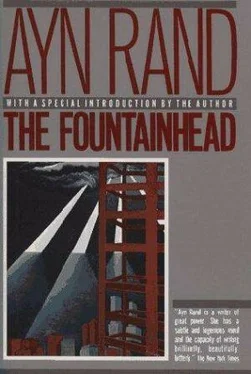Mrs. Keating was out on the porch. She was feeding a couple of canaries in a cage suspended over the railing. Her pudgy little hand stopped in mid-air when she saw him. She watched him with curiosity. She tried to pull her mouth into a proper expression of sympathy; she succeeded only in betraying that the process was an effort.
He was crossing the porch without noticing her. She stopped him.
"Mr. Roark!"
"Yes?"
"Mr. Roark, I'm so sorry about — " she hesitated demurely, " — about what happened this morning."
"What?" he asked.
"Your being expelled from the Institute. I can't tell you how sorry I am. I only want you to know that I feel for you."
He stood looking at her. She knew that he did not see her. No, she thought, it was not that exactly. He always looked straight at people and his damnable eyes never missed a thing, it was only that he made people feel as if they did not exist. He just stood looking. He would not answer.
"But what I say," she continued, "is that if one suffers in this world, it's on account of error. Of course, you'll have to give up the architect profession now, won't you? But then a young man can always earn a decent living clerking or selling or something."
He turned to go.
"Oh, Mr. Roark!" she called.
"Yes?"
"The Dean phoned for you while you were out."
For once, she expected some emotion from him; and an emotion would be the equivalent of seeing him broken. She did not know what it was about him that had always made her want to see him broken.
"Yes?" he asked.
"The Dean," she repeated uncertainly, trying to recapture her effect. "The Dean himself through his secretary."
"Well?"
"She said to tell you that the Dean wanted to see you immediately the moment you got back."
"Thank you."
"What do you suppose he can want now?"
"I don't know."
He had said: "I don't know." She had heard distinctly: "I don't give a damn." She stared at him incredulously.
"By the way," she said, "Petey is graduating today." She said it without apparent relevance.
"Today? Oh, yes."
"It's a great day for me. When I think of how I skimped and slaved to put my boy through school. Not that I'm complaining. I'm not one to complain. Petey's a brilliant boy."
She stood drawn up. Her stout little body was corseted so tightly under the starched folds of her cotton dress that it seemed to squeeze the fat out to her wrists and ankles.
"But of course," she went on rapidly, with the eagerness of her favorite subject, "I'm not one to boast. Some mothers are lucky and others just aren't. We're all in our rightful place. You just watch Petey from now on. I'm not one to want my boy to kill himself with work and I'll thank the Lord for any small success that comes his way. But if that boy isn't the greatest architect of this U.S.A., his mother will want to know the reason why!"
He moved to go.
"But what am I doing, gabbing with you like that!" she said brightly. "You've got to hurry and change and run along. The Dean's waiting for you."
She stood looking after him through the screen door, watching his gaunt figure move across the rigid neatness of her parlor. He always made her uncomfortable in the house, with a vague feeling of apprehension, as if she were waiting to see him swing out suddenly and smash her coffee tables, her Chinese vases, her framed photographs. He had never shown any inclination to do so. She kept expecting it, without knowing why.
Roark went up the stairs to his room. It was a large, bare room, made luminous by the clean glow of whitewash. Mrs. Keating had never had the feeling that Roark really lived there. He had not added a single object to the bare necessities of furniture which she had provided; no pictures, no pennants, no cheering human touch. He had brought nothing to the room but his clothes and his drawings; there were few clothes and too many drawings; they were stacked high in one comer; sometimes she thought that the drawings lived there, not the man.
Roark walked now to these drawings; they were the first things to be packed. He lifted one of them, then the next, then another. He stood looking at the broad sheets.
They were sketches of buildings such as had never stood on the face of the earth. They were as the first houses built by the first man born, who had never heard of others building before him. There was nothing to be said of them, except that each structure was inevitably what it had to be. It was not as if the draftsman had sat over them, pondering laboriously, piecing together doors, windows and columns, as his whim dictated and as the books prescribed. It was as if the buildings had sprung from the earth and from some living force, complete, unalterably right. The hand that had made the sharp pencil lines still had much to learn. But not a line seemed superfluous, not a needed plane was missing. The structures were austere and simple, until one looked at them and realized what work, what complexity of method, what tension of thought had achieved the simplicity. No laws had dictated a single detail. The buildings were not Classical, they were not Gothic, they were not Renaissance. They were only Howard Roark.
He stopped, looking at a sketch. It was one that had never satisfied him. He had designed it as an exercise he had given himself, apart from his schoolwork; he did that often when he found some particular site and stopped before it to think of what building it should bear. He had spent nights staring at this sketch, wondering what he had missed. Glancing at it now, unprepared, he saw the mistake he had made.
He flung the sketch down on the table, he bent over it, he slashed lines straight through his neat drawing. He stopped once in a while and stood looking at it, his fingertips pressed to the paper; as if his hands held the building. His hands had long fingers, hard veins, prominent joints and wristbones.
An hour later he heard a knock at his door.
"Come in!" he snapped, without stopping.
"Mr. Roark!" gasped Mrs. Keating, staring at him from the threshold. "What on earth are you doing?"
He turned and looked at her, trying to remember who she was.
"How about the Dean?" she moaned. "The Dean that's waiting for you?"
"Oh," said Roark. "Oh, yes. I forgot."
"You ... forgot?"
"Yes." There was a note of wonder in his voice, astonished by her astonishment.
"Well, all I can say," she choked, "is that it serves you right! It just serves you right. And with the commencement beginning at four-thirty, how do you expect him to have time to see you?"
"I'll go at once, Mrs. Keating."
It was not her curiosity alone that prompted her to action; it was a secret fear that the sentence of the Board might be revoked. He went to the bathroom at the end of the hall; she watched him washing his hands, throwing his loose, straight hair back into a semblance of order. He came out again, he was on his way to the stairs before she realized that he was leaving.
"Mr. Roark!" she gasped, pointing at his clothes. "You're not going like this?"
"Why not?"
"But it's your Dean!"
"Not any more, Mrs. Keating."
She thought, aghast, that he said it as if he were actually happy.
The Stanton Institute of Technology stood on a hill, its crenelated walls raised as a crown over the city stretched below. It looked like a medieval fortress, with a Gothic cathedral grafted to its belly. The fortress was eminently suited to its purpose, with stout, brick walls, a few slits wide enough for sentries, ramparts behind which defending archers could hide, and corner turrets from which boiling oil could be poured upon the attacker — should such an emergency arise in an institute of learning. The cathedral rose over it in lace splendor, a fragile defense against two great enemies: light and air.
Читать дальше










